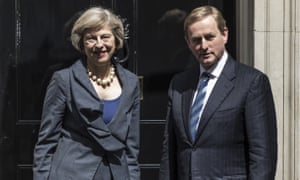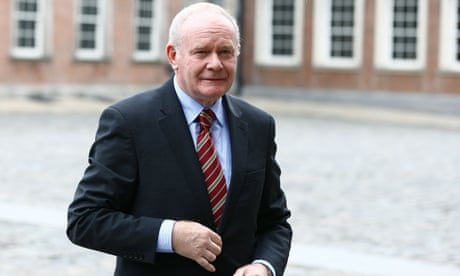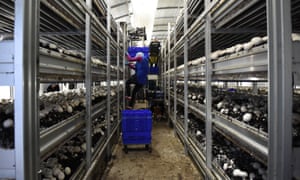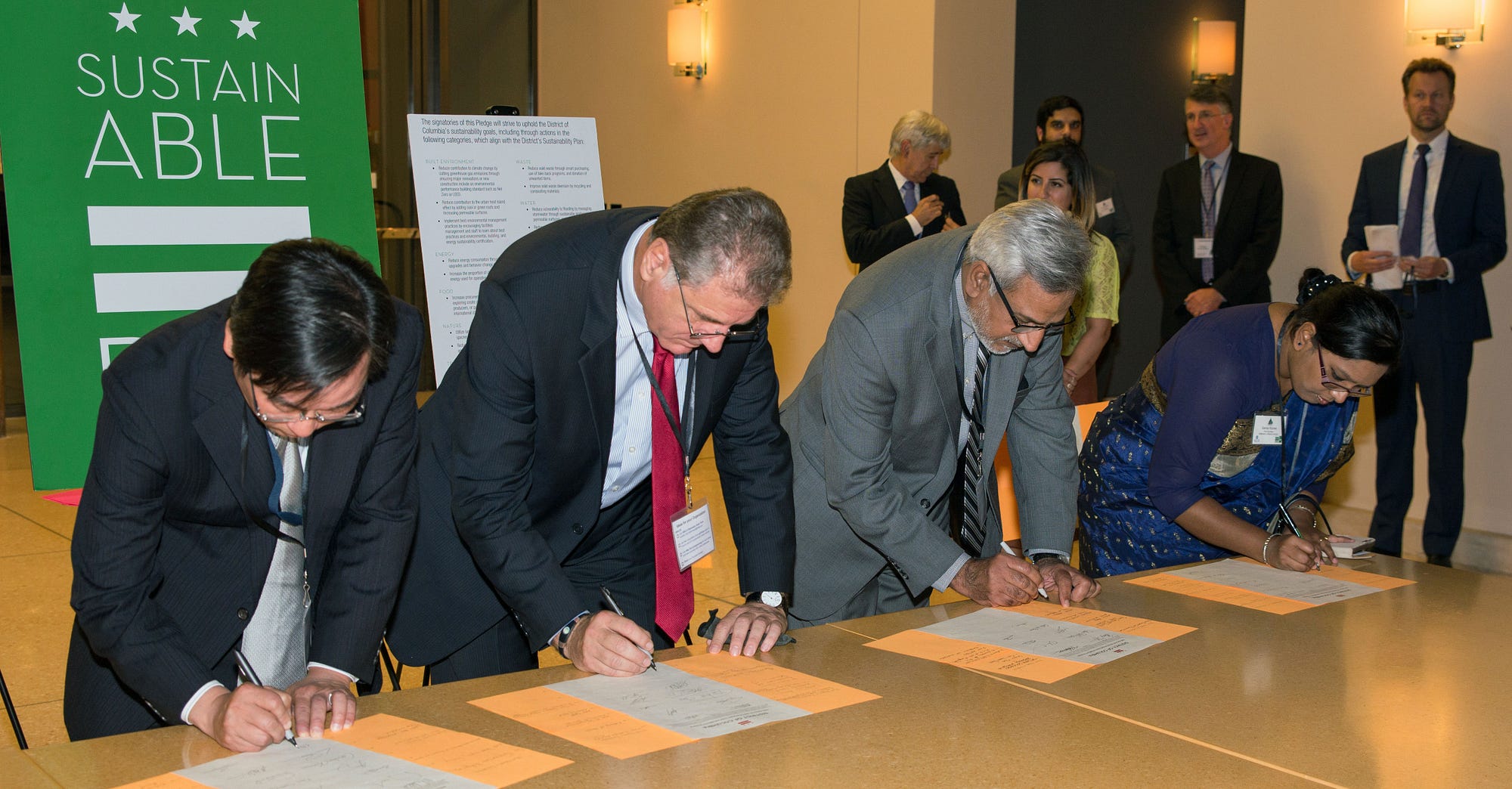 Representatives from Foreign Missions in the Washington D.C. area sign a pledge committing to climate and environmental action in the area. (Daniel Gaush| State Department Photo)
Representatives from Foreign Missions in the Washington D.C. area sign a pledge committing to climate and environmental action in the area. (Daniel Gaush| State Department Photo)
By: Caroline D’Angelo and Rebecca Rogers, U.S. State Department’s Office of Management Policy, Rightsizing, and Innovation
“And today, the world has officially crossed the threshold for the Paris Agreement to take effect. Today, the world meets the moment. And if we follow through on the commitments that this agreement embodies, history may well judge it as a turning point for our planet.” — President Obama, October 5, 2016 [read the whole speech here]
On Wednesday, October 5, the global community hit the target needed for the Paris Agreement to go into force. That evening, just hours after President Obama’s remarks, ambassadors and other representatives from over 60 embassies gathered with the Director of the District of Columbia’s Department of Energy and Environment to sign a pledge committing to climate and environmental action in Washington, D.C.
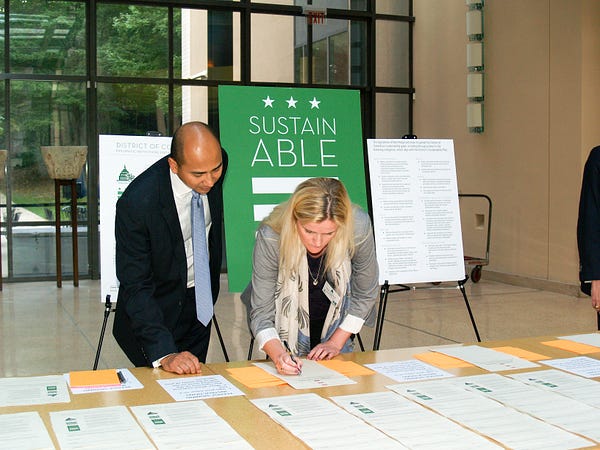
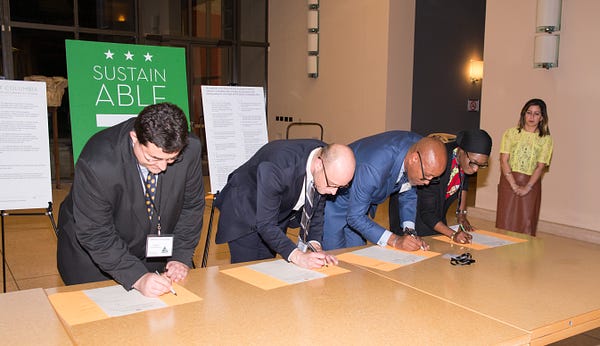 Several Ambassadors and other representatives from Foreign Missions in Washington D.C. sign a pledge committing to climate and environmental action in the DC area. (Daniel Gaush| State Department Photos)
Several Ambassadors and other representatives from Foreign Missions in Washington D.C. sign a pledge committing to climate and environmental action in the DC area. (Daniel Gaush| State Department Photos)
Originally created and signed in 2012, the pledge was updated this year to reflect the goals of the Paris Agreement and the city’s SustainableDC plan. The pledge signifies the embassies’ entry into the DC Greening Embassies Forum, a platform that unites the diplomatic community together with the city to support climate and environmental action. The World Bank and International Finance Corporation also signed the pledge.
The Forum has grown over the years. With the commitments of over 20 new embassies, the Forum now encompasses over 100 embassies and international organizations. The Forum recognizes that embassies -– as highly visible landmarks and hubs for connecting people, ideas, and innovations — have a role to play in combatting climate change.
After all, the Paris Agreement is global, but many of climate change’s impacts –- and solutions -– are local.
Member embassies benefit from regular workshops and seminars on a wide range of topics, including green building certification, energy efficiency, clean energy policy, new financing mechanisms for renewable energy, and sustainable transportation.
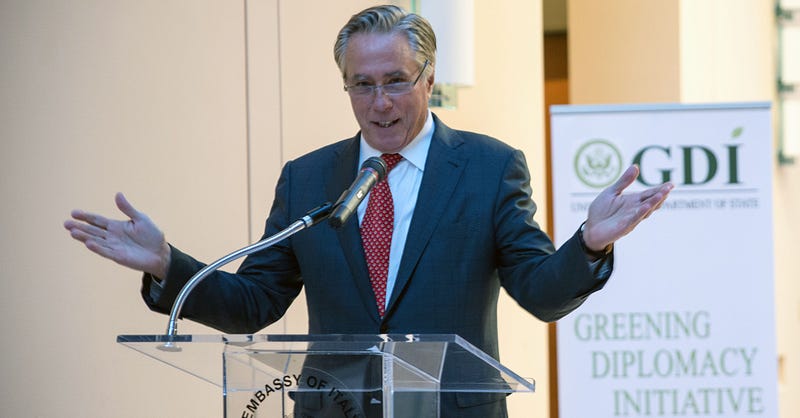 Senior Advisor to the Secretary Ambassador David Thorne (Daniel Gaush| State Department Photo)
Senior Advisor to the Secretary Ambassador David Thorne (Daniel Gaush| State Department Photo)
“Sub-national engagements that engage the diplomatic corps, such as this Forum, are significant tools in reaching our global climate and clean energy goals,” said Ambassador David H. Thorne, Senior Advisor to Secretary Kerry, at the event.
City-based environmental engagement and diplomacy is growing. The Forum now has chapters in Rome, Italy and Bangkok, Thailand. In fact, another speaker and pledge signer, Tommy Wells, director of D.C.’s Department of Energy and Environment (DOEE), had just returned from Copenhagen, Denmark, where he signed an environmental partnership and exchange with the government of that city.
Wells noted that collecting –- and acting –- on innovative ideas has helped the District of Columbia reduce their greenhouse gas emissions by 23 percent between 2006 and 2013, even while the city’s population and economy grew.
Embassies have also used knowledge gained from the Forum to reduce their carbon and environmental footprints.
The Embassy of France partnered with the city to install at 10,000 square foot green roof on one of its buildings, which helps reduce stormwater run-off and heat-island effects, and increases occupant comfort in the offices below. Also, D.C. is also now home to one of the world’s two highest-certified green embassies, the Embassy of Finland, which received Leadership in Energy and Environment Design (LEED) Platinum certification. Other Washington embassies with LEED certifications include the Embassies of Canada, the Netherlands, the European Union, and the United Arab Emirates.
Beyond physical infrastructure, embassies are also working to reduce their footprint through encouraging individual actions. The embassies of Germany and Australia regularly encourage biking to work. Several Ambassadors walked to the ceremony in celebration of the spirit of the pledge.
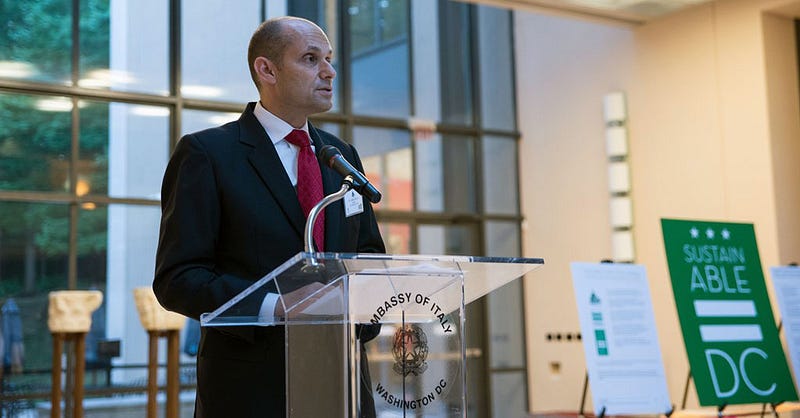 Director of the Office of Management Policy, Rightsizing, and Innovation Ambassador Adam Namm speaks at the DC Greening Embassies Forum event in Washington, D.C. (Daniel Gaush| State Department Photo)
Director of the Office of Management Policy, Rightsizing, and Innovation Ambassador Adam Namm speaks at the DC Greening Embassies Forum event in Washington, D.C. (Daniel Gaush| State Department Photo)
The Department of State has also worked to reduce its environmental footprint in D.C. Ambassador Adam E. Namm, Director of State’s Office of Management Policy, Rightsizing and Innovation, noted that nearly half of the Department’s energy needs for its facilities in DC and Maryland come from offsite wind and solar farms through a power purchase agreement for which the Department incurred no upfront costs. Namm also mentioned that he arrived in a Department of State Chevrolet Volt hybrid electric car.
In the build-up to COP21 last year, the Department of State and Bloomberg Philanthropies launched “Our Cities, Our Climate” to advance innovation by urban areas in the fight against climate change. We look forward to hosting this program again this year to help implement climate action and encourage you to consider ways you and your organizations can do your part to take actions to protect the environment.
About the Authors: Caroline D’Angelo works on the Forum and U.S. Department of State’s greening efforts in the Office of Management Policy, Rightsizing, and Innovation (M/PRI). Rebecca Rogers is a virtual fellow from Austin College for M/PRI.
This entry originally appeared on DipNote, the U.S. Department of State Official Blog.
